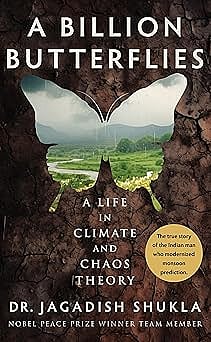Predicting the Rain

Every Indian knows the smell of the first rain that announces the arrival of the monsoon. That earthy scent, rising from the parched soil, reminds one that the end of the long, harsh summer has arrived. The first rain is a storyteller, full of legends of renewal, hope, and the seasonal cycle of nature. In his autobiography, A Billion Butterflies, Dr Jagdish Shukla, a scientist, turns into a storyteller, crafting a narrative full of personal anecdotes mixed with the prediction of rain.
While the first rain elicits nostalgia, it is difficult for the younger generations to remember that it has also been a cause of worry for most Indians. India was, and is, an agrarian country, and monsoons still drive its economy. Farmers across the country depend on monsoonal rains, and until recently, were always guessing whether the rain gods would be kind. Shukla, who grew up in the tiny village of Mirdha in Uttar Pradesh, witnessed the monsoon’s unpredictability firsthand as a child. He saw how farmers prayed for good rains, and when their prayers went unanswered, they had no other options but to suffer.
Shukla grew up to become one of the most eminent meteorologists in the world. A recipient of the Padma Shri, he has made seminal contributions to weather and climate sciences, revolutionising monsoon forecasting. In A Billion Butterflies, he narrates his journey from a small village in India to the top universities in the US, overcoming challenges with the singular goal of improving farmers’ lives worldwide.
Shukla was lucky to have a family that valued and supported his education. This education, a steely grit to make the best of his opportunities, along with a healthy dose of chaotic luck, helped him collaborate with some of the world’s best scientists, giving him access to the best infrastructure, and solve the ‘unsolvable’ problem of seasonal monsoon prediction. His journey took him from Mirdha to the Banares Hindu University, after which he got a job at the Oil and Natural Gas Corporation (ONGC), prospecting oil fields. Luckily, on a whim he attended an interview for a position at the Indian Institute of Tropical Meteorology (IITM, Pune), leading to a sequence of events where he not only helped solve some of the biggest problems of weather prediction, but ironically, worked on the Inter-Governmental Panel for Climate Change (IPCC), advocating for a reduction in fossil fuel emissions.
Imran Khan: Pakistan’s Prisoner
27 Feb 2026 - Vol 04 | Issue 60
The descent and despair of Imran Khan
While Shukla spent most of his life outside India, he was heavily involved in changing how Indian scientists predicted weather. He played an instrumental role in India getting its first supercomputer from the US, which initiated the era of numerical weather forecasting in India. Numerical weather forecasting, which involves solving equations that describe the atmospheric phenomena using current weather observations and physical laws, has revolutionised short-range weather prediction (days to weeks), and Shukla’s personal favourite, seasonal weather prediction (total rainfall during monsoon), helps farmers plan.
While A Billion Butterflies at times reads like a self-congratulatory text, it describes an incredible journey, aiming to inspire future generations. With surprising honesty about his personal life—an unsuccessful arranged marriage, estrangement from his daughter, and the death of his son—it also sheds light on the broader history and evolution of weather and climate sciences. The book humanises the often jargon-filled world of science and highlights the emotional costs of a life dedicated to scientific discovery.
While the book showcases the success story of a village boy making it to the top of the academic world, including being part of a Nobel Prize-winning team, it raises a lingering question: What if India had retained brilliant scientists like Shukla, and what must it change to ensure that this happens in the future?

